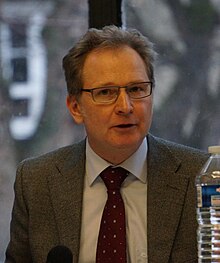Matthias Schulz (historian)
Matthias Schulz (born July 6, 1964 in Lüneburg ) is a German historian . He is a full professor of the history of international relations and transnational history at the University of Geneva .
Career
After studying history and North American studies in Hamburg and New Orleans as well as international relations in Geneva, he started working at the University of Hamburg in 1995 under the direction of Wolf D. Gruner , Jean Monnet Professor for European and Modern History, with a thesis on the League of Nations doctorates . As a research assistant at the University of Rostock , he taught modern European and transatlantic history from 1996 to 2001. After his habilitation with a thesis on the European Concert of the Great Powers and appointment as private lecturer at the University of Rostock, he taught German, European and transatlantic history from 2001 to 2006 as DAAD Visiting Associate Professor at Vanderbilt University (USA); In 2006/7 followed a research stay at the Institute for European History in Mainz and a teaching position at the University of Mannheim and in 2007 the call to the University of Geneva. From 2010 to 2013 he headed the international relations course there, and has been director of the Department of General History since 2014.
His research interests include a. the political and social relations of the 19th and 20th centuries, especially between Germany and France as well as Europe and the USA, the genesis and development of international institutions and their contribution to the regulation of international relations, the history of European integration as well as the intellectual roots and practices of humanitarian Non-governmental organizations. He is a member of the Swiss Diplomatic Documents Commission , a member of the editorial team of the historical journal Relations internationales and a member of the advisory board of the European Review of International Studies .
Fonts
As an author:
- Regionalism and the shaping of Europe. The constitutional significance of the region in the European drama between integration and disintegration (= contributions to German and European history. Vol. 8). Kraemer, Hamburg 1993, ISBN 3-926952-81-4 .
- Germany, the League of Nations and the question of the European economic order 1925–1933 (= contributions to German and European history. Vol. 19). Kraemer, Hamburg 1997, ISBN 3-89622-009-8 (also: Dissertation, University of Hamburg, 1995).
- Norms and Practice. The European Concert of the Great Powers as Security Council, 1815–1860 (= Studies on International History. Vol. 21). Oldenbourg, Munich 2009, ISBN 978-3-486-58788-3 (also: habilitation thesis, University of Rostock, 2002).
- The 19th century (1789–1914) (= basic history course ). With the collaboration of Michael Erbe and Nicola Brauch . Kohlhammer, Stuttgart 2011, ISBN 978-3-17-018974-4 .
As editor:
- with Mareike König: The Federal Republic of Germany and European unification. 1949-2000. Political actors, social forces and international experiences. Festschrift for Wolf D. Gruner on his 60th birthday. Steiner, Stuttgart 2004, ISBN 3-515-08465-7 .
- with Eckhardt Fuchs: Globalization and transnational civil society in the era of the League of Nations (= Journal for Historical Science . Vol. 54, No. 10). Metropol, Berlin 2006.
- with Thomas A. Schwartz: The Strained Alliance: US-European Relations from Nixon to Carter. German Historical Institute, Washington DC, and Cambridge University Press, Cambridge 2010, ISBN 978-0-521-89999-4 .
Web links
- Literature by and about Matthias Schulz in the catalog of the German National Library
- Curriculum vitae and publications on the website of the University of Geneva (French, partly German)
| personal data | |
|---|---|
| SURNAME | Schulz, Matthias |
| BRIEF DESCRIPTION | German historian |
| DATE OF BIRTH | July 6, 1964 |
| PLACE OF BIRTH | Luneburg |
